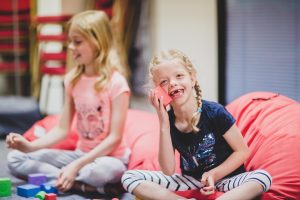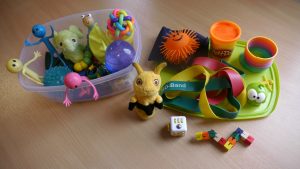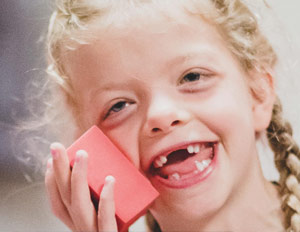
Working with Children With Additional Needs
Tuesday 28th April 202020% of children and young people in the UK have an additional need or disability of some kind 1, that’s roughly 2.5 million; every Boys’ Brigade Company is likely to include children and young people with additional needs and many of them will need some support.
A Mumsnet and Scope joint study shows that many of these children and young people, and their families, feel excluded from a wide range of social and other activities2, so how could The Boys’ Brigade reach out to and meet the needs of these children and their families?
Inclusion is something that should be offered to every child; it doesn’t stop at wider doors, ramps and disabled loos but should also be about creating a culture of welcome and belonging for all, as well as looking to develop the faith of every child whatever their ability or needs.
Urban Saints has responded to this challenge by leading the way for children’s and youth workers within both Church and secular sectors, including uniformed organisations, to gain the knowledge, skills, resources and inspiration they need to enable them to reach and support all children and young people and to introduce them to the love, grace and hope of Jesus.
As BB Companies across the country plan for their summer programmes, perhaps even looking to attend a summer camp, what does reaching out to children and young people with additional needs and disabilities look like in this context? What can Companies do to include and create a culture of welcome and belonging for every child and young person, while ensuring the safety and well-being of all?
In this article, we’ll look at a range of tips and ideas that you can add to your ‘toolkit’ as you plan for the summer and beyond. Practical strategies that have been proven to make a real difference to how children’s and youth work can successfully include everyone whether in weekly groups, holiday clubs or summer camps. There will also be some ‘signposts’ towards other resources and sources of information and help that you can access going forward.
‘Inclusion Leader/ Champion’ or ‘Company SENCO’
Of all the strategies that can be put in place to support children, young people, and also adult leaders with additional needs or disabilities, the single most important and impactful is to have someone who ‘owns’ this. Where there is an Inclusion Leader/ Champion or ‘SENCO’ (an education term meaning ‘Special Educational Needs Co-Ordinator’) it can be transforming, enabling everyone to be treated equally and supported appropriately.
The person fulfilling this role doesn’t necessarily need to have an in-depth health, education or social care background, but be willing to look at the things the Company does through the experience of the children and young people that you journey with. What is hard for them to access; what barriers are there including physical, programme, or cultural barriers? What modifications can be readily made to make things easier and more inclusive?
For example, a nine-year-old Autistic boy may find that coming to the weekly meeting, or a main meeting at a summer camp, at the same time as everyone else can be very hard as his senses are overwhelmed by the noise, number of people etc. Could he be invited to come in 5-10 minutes earlier and have a familiar ‘safe place’ where he can settle as others gradually come in? Could some resources be provided giving him something to do while he acclimatises to the environment?
Or what about a twelve-year-old Dyslexic girl who finds that the words to the songs, which are creatively displayed on the screen on top of a beautiful photo or video clip, are unreadable for her. Could there be a screen that doesn’t have a background image so that people have a choice of what works best for them?
Sometimes it’s as simple as thinking about the words we use; a leader who excitedly shouts out “Everybody jump up on your feet!” may not realise what that can do to someone who has a physical mobility disability.
The Inclusion Leader and Safeguarding Leader also make a great team, working closely together to ensure the safety of everyone, being points of contact for parents/carers who need to talk to someone about the support needed for their child, ensuring that the whole team think about these two vitally important strands of children’s and youth work together.
Building support strategies/ communication with parents
 So often we can be reactive to the arrival of a child or young person with additional needs, rather than anticipating in advance that they might like to engage with our BB Company, holiday club, camp etc. Reacting is never as good as preparing; being ready with strategies in place, so that everyone can be included in any activity that we offer, is always better.
So often we can be reactive to the arrival of a child or young person with additional needs, rather than anticipating in advance that they might like to engage with our BB Company, holiday club, camp etc. Reacting is never as good as preparing; being ready with strategies in place, so that everyone can be included in any activity that we offer, is always better.
We can also fall into the trap of thinking that we need to build these strategies on our own, whereas there are likely to be strategies already in place to effectively support children with additional needs in other areas of their lives e.g. at school and at home. Understanding what support strategies are in place in these other settings, and bringing those strategies into our own activities, provides us with ready-made ideas to try as well as providing consistency and continuity for each child.
The language we use when seeking this information from parents/ carers is vitally important too. How often do we include a box on our joining or consent that asks, “Does your child have any special needs?”, and are then surprised when that box is left blank and a child subsequently arrives who needs a lot of support. Asking parents how their child best likes to be supported and helped, what they enjoy doing, what positive things people say about them, are all questions that are much more likely to unlock useful and helpful information and be great conversation starters. A useful tool to help with this is a ‘one-page profile’ and sample templates for these can be found in the resources area of the ‘Sheffkids’ website: www.sheffkids.co.uk
Once a child is in our setting, how we then communicate with parents/carers during or after the session is something we also need to think about, especially for children with additional needs. Helping parents to inform us what kind of a day their child is having when they arrive, and to help them know how their child has done while with us, is key to building this important relationship. Again, language is key, highlighting the achievements of a child while asking for advice in how to support them better in areas where they might need a little extra help, while avoiding negative comments.
Recruiting one-to-one support or ‘buddies’
Many children or young people with additional needs can become anxious and stressed if they are left to cope on their own. Not knowing where they are in the programme, what is happening now/next, what is expected of them, can all build up to the point where they struggle to cope with the feelings they are experiencing and this may then result in a meltdown which can be hard for them and for others.
Having one-to-one support can make a big difference, providing a child or young person with someone who can help them understand what is happening now and next and what they are supposed to be doing. To check that they are coping well and to know what to do to support them if they are struggling.
One-to-one support team members don’t have to be ‘typical’ children’s or youth workers; their primary role is not to lead or run activities, rather to pastorally support a child or young person. Someone with a caring, loving, empathic approach is ideal. We sometimes have to fish in a different pond for these people, looking outside of the usual children’s work demographic to other groups. The grandparent generation can be really great in this role, as can other young people as ‘buddies’.
Clearly it is important that any one-to-one support team members, or buddies, are suitably safeguarding vetted and trained, both for their own protection and the protection of the child/young person they are supporting (see also ‘Safeguarding and additional needs’ below).
Sensory support

It is important to provide safe ways for children and young people with additional needs to be able to regulate their senses, calm and relax. A safe sensory room or zone, appropriately supervised, and equipped with calming lighting, sounds, seating/floormats etc. and with safe, calming things for children to engage with to help them relax, will be helpful. Sensory overload can be a common issue for children and young people with a range of additional needs and so providing ways for them to manage and regulate this sensory input is essential. A simple pair of ear defenders can make the difference between someone being able to enjoy the programme or being in physical pain because of the noise.
Another useful addition to the kit list is a ‘fiddles’ or ‘fidget’ box. This usually contains an eclectic selection of items that can be stretched, squeezed, spun, clicked or simple fiddled with. The sensory stimulus that this provides can aid focus and concentration, especially for children that might otherwise be easily distracted.
Using what they love to help them learn
Most of us learn best when our learning is fun, engaging us in activities that we enjoy and are good at. It’s no different for children and young people with additional needs. Using what they enjoy to help them learn during weekly groups, holiday clubs, summer camps etc. will often deliver great results.
Children with additional needs might be really good at jigsaw puzzles, get them to build a jigsaw of the story you are telling or the theme you are sharing. Maybe they like Lego? Get them building something from the Bible; I recently got sent a photo of a Lego version of the Temple of Jerusalem, brilliantly built by some young people with additional needs, although I have a feeling that Darth Vader has never been the High Priest before! And did you know there is a (Lego) Brick Bible? A lot of young people with additional needs enjoy spending time in the online world, with Minecraft being a favourite… did you know that there is a Minecraft Bible too? There is also a Minecraft Bible YouTube channel, called ‘Pixel Heart Bible’, give it a look. Why not get them building Bible scenes online? Creating Jericho in Minecraft and then marching around it before bringing it crashing down would bring the story to life far more than just telling them the story!
Safeguarding and additional needs
We’ve touched on a few safeguarding areas already, but there are other areas where careful thought and advice needs to be sought when supporting children and young people with additional needs. Some children and young people, for example, may need help with toileting, or in a camp setting with showering or getting dressed. Suitable guidelines to protect both children and adults will need to be considered, to ensure that no adult is alone with a child in a toilet, shower block etc.
Some children or young people with additional needs may find it harder to communicate effectively, which raises the risk of them being unable to alert someone if they are being abused. All of the usual signs to look out for when working with any child will apply here, but with an increased duty of care due to the vulnerability of the child. Understand how a child or young person communicates best, maybe through signing, symbols, gestures, speech or a combination of several of these, so that they can be better understood.
Benefits
It is sometimes easy for us to focus on the challenges around supporting children with additional needs or disabilities, but this would be to ignore the amazing benefits that doing this well can have for the whole group. Getting this right makes the group, camp or Church a place of welcome and belonging for everyone; a place where people are missed if they can’t come, for all of the right reasons. The culture of caring, supporting and inclusiveness that this creates is wonderful to see and is so transforming for everyone.
Further resources and support
For more information on Urban Saints and their additional needs ministry programme, please visit: urbansaints.org/additionalneeds
For information, support and resources to help with your work with children and young people with additional needs, please visit the Additional Needs Alliance at additionalneedsalliance. org.uk or join the Facebook group (search for ‘Additional Needs Alliance’).
Mark Arnold
Additional Needs Ministry Director – Urban Saints Co-Founder – Additional Needs Alliance






